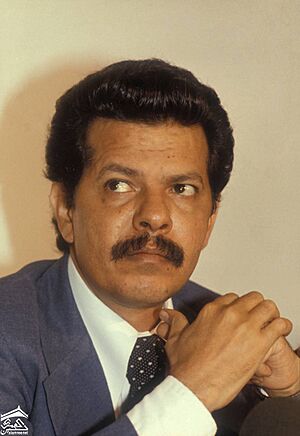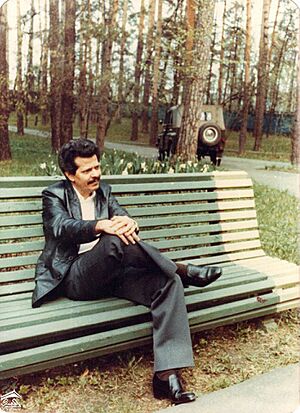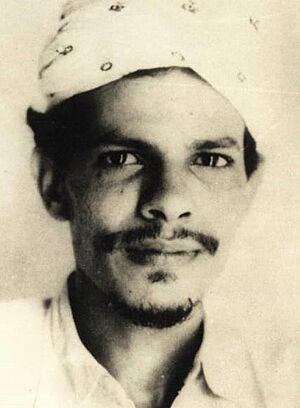Abdul Fattah Ismail facts for kids
Quick facts for kids
Abdul Fattah Ismail
|
|
|---|---|
|
عبد الفتاح إسماعيل
|
|
 |
|
| Chairman of the Presidium of Supreme People's Council (South Yemen) | |
| In office 1970 – 21 April 1980 |
|
| Preceded by | Position established |
| Succeeded by | Ali Nasir Muhammad |
| 1st General Secretary of the Yemeni Socialist Party | |
| In office 21 December 1978 – 21 April 1980 |
|
| Preceded by | Position established (himself as Secretary-General of the National Front) |
| Succeeded by | Ali Nasir Muhammad |
| Secretary-General of the National Front | |
| In office 22 June 1969 – 21 December 1978 |
|
| President | Salim Rubai Ali |
| Preceded by | Qahtan al-Shaabi |
| Succeeded by | Position abolished (himself as General Secretary of the Yemeni Socialist Party) |
| Personal details | |
| Born | 28 July 1939 Ta'izz, Kingdom of Yemen |
| Died | 13 January 1986 (aged 46) Aden, South Yemen |
| Political party | Yemeni Socialist Party |
| Residence | Aden |
| Profession | Oil refinery worker, teacher |
| Awards | |
| Military service | |
| Allegiance | |
Abd al-Fattah Ismail (Arabic: عبد الفتاح إسماعيل; born July 28, 1939 – died January 13, 1986) was an important political leader in South Yemen. This country was officially called the People's Democratic Republic of Yemen. He was a key figure from 1978 to 1980.
He became the Chairman of the Presidium of the Supreme People's Council (which means he was the head of the country). He also helped create and lead the Yemeni Socialist Party. He held these roles from December 21, 1978, to April 21, 1980. He disappeared during a conflict in 1986, and his body was never found.
Contents
Early Life and Political Start
Abdul Fattah was born in July 1939 in a place called Al-Hujariah in North Yemen. His family was not rich. When he was about 18, he moved to Aden. There, he trained and worked at a British Petroleum oil refinery from 1956 to 1959.
While working, Abdul Fattah started to care deeply about workers' rights. He helped organize workers and speak up for them. He also helped start the Arab Nationalist Movement in South Yemen. Because of his political work, the British authorities in Aden arrested him.
Becoming a Revolutionary Leader

In 1961, Abdul Fattah became a school teacher in Aden. He continued his political activities. He was one of the people who started the National Front for the Liberation of South Yemen (NLF). This group wanted to free South Yemen from British rule.
When the NLF started a revolution on October 14, 1963, Abdul Fattah became a full-time revolutionary. He led the NLF's secret military group in Aden. He also continued his political work.
He was chosen to be part of the NLF's main leadership in 1965, 1966, and 1967. After South Yemen became independent in 1967, he was made the Minister of Culture. He played a big part in guiding the revolution towards a more progressive path.
Leading South Yemen
In March 1968, some members of the NLF arrested him. He went into exile, which means he had to leave the country. While away, he wrote a plan for how the country should be run. He then helped bring together the left-wing members of the NLF. This group took power again on June 22, 1969, in what was called the "Correction Step."
After this change, Abdul Fattah was chosen as the Secretary General of the NLF. This made him the main leader of the country. In 1970, he also became the Chairman of the Presidium. He helped the NLF work with other groups to form the Yemeni Socialist Party (YSP).
In October 1978, he was elected the Secretary General of the YSP. He believed in a type of government similar to the Soviet Union. In 1979, he signed an important agreement with the Soviet Union.
Later Years and Disappearance
In 1980, Abdul Fattah stepped down from his leadership roles. He said it was for health reasons. Ali Nasir Muhammad took over from him. Abdul Fattah was still named president of the party. He then went to Moscow for medical care.
He returned in 1985 because of growing problems between Ali Nasir Muhammad and other leaders in the YSP. In October 1985, he was elected to important positions within the YSP. However, a big conflict started on January 13, 1986. This was a violent fight in Aden between supporters of Ali Nasir and supporters of Abdul Fattah. This event is known as the South Yemen Civil War.
The fighting lasted for over a month. Many people were hurt or died. Ali Nasir was eventually removed from power.
Disappearance and Presumed Death
During this conflict, Abdul Fattah disappeared. He was last seen leaving the YSP office in an armored vehicle. Some reports say he was killed when his home was attacked. However, his final fate is not known. His body was never found.
 | Isaac Myers |
 | D. Hamilton Jackson |
 | A. Philip Randolph |


